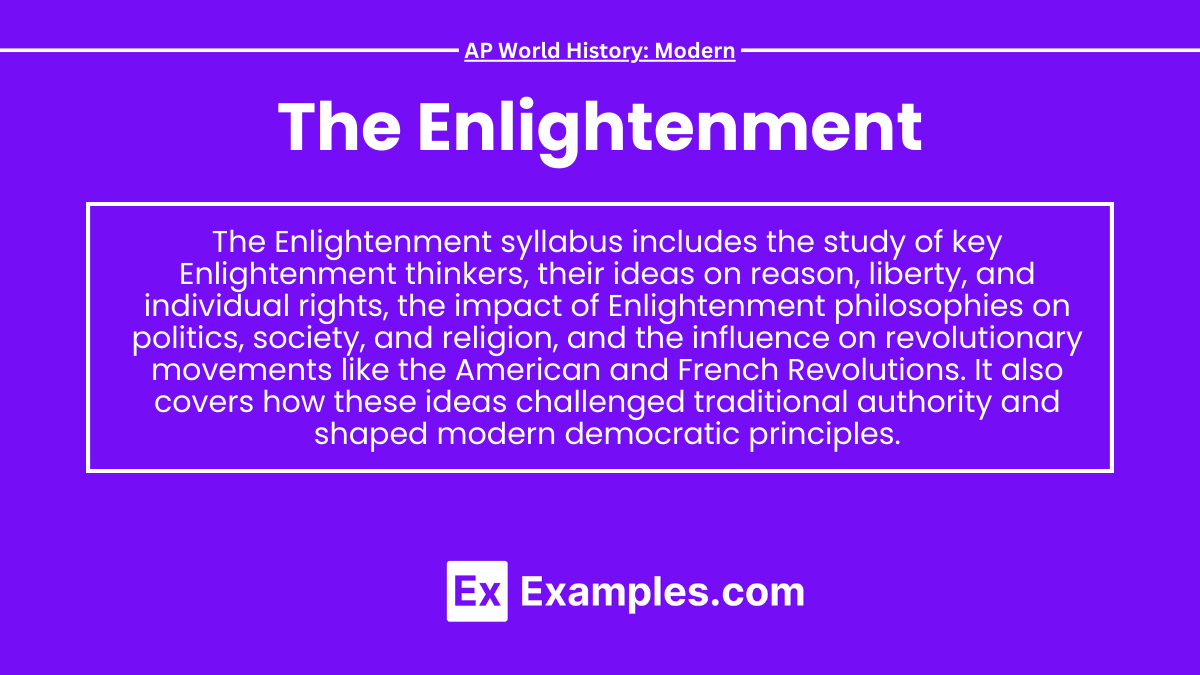The Enlightenment, also known as the Age of Reason, was an intellectual and philosophical movement that emerged in the late 17th and 18th centuries. It emphasized reason, individualism, and scientific inquiry over tradition and religious authority, influencing various aspects of society, politics, and economics.
Learning Objective
In studying “The Enlightenment” for AP World History: Modern, you should learn to identify the key ideas and philosophers that shaped the movement, including concepts of reason, individual rights, and social contract theory. Analyze how Enlightenment thought challenged traditional authority, influenced revolutions, and sparked social and political reforms. Evaluate the global impact of Enlightenment ideals on governance, science, and human rights, and explore how these ideas laid the foundation for modern democratic institutions and legal systems. Additionally, examine the role of the Enlightenment in fostering intellectual exchanges and shaping cultural shifts across different societies.
1. Key Ideas and Philosophies
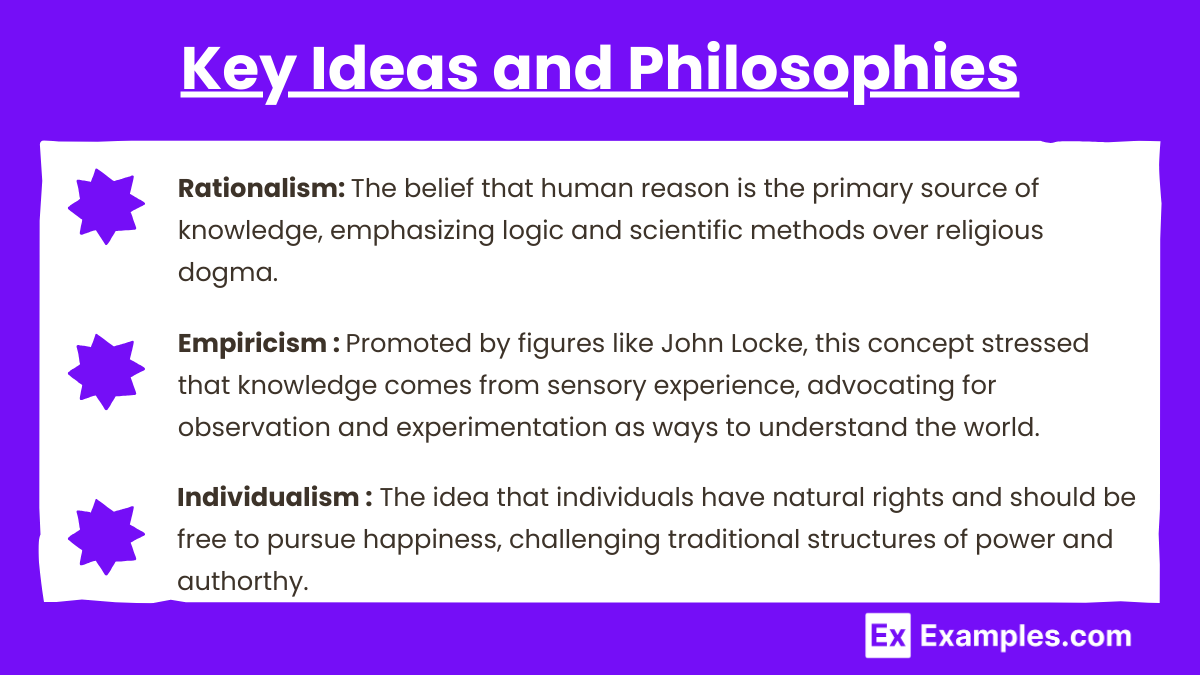
- Rationalism: The belief that human reason is the primary source of knowledge, emphasizing logic and scientific methods over religious dogma.
- Empiricism: Promoted by figures like John Locke, this concept stressed that knowledge comes from sensory experience, advocating for observation and experimentation as ways to understand the world.
- Individualism: The idea that individuals have natural rights (life, liberty, and property) and should be free to pursue happiness, challenging traditional structures of power and authority.
2. Impact of the Enlightenment on Politics
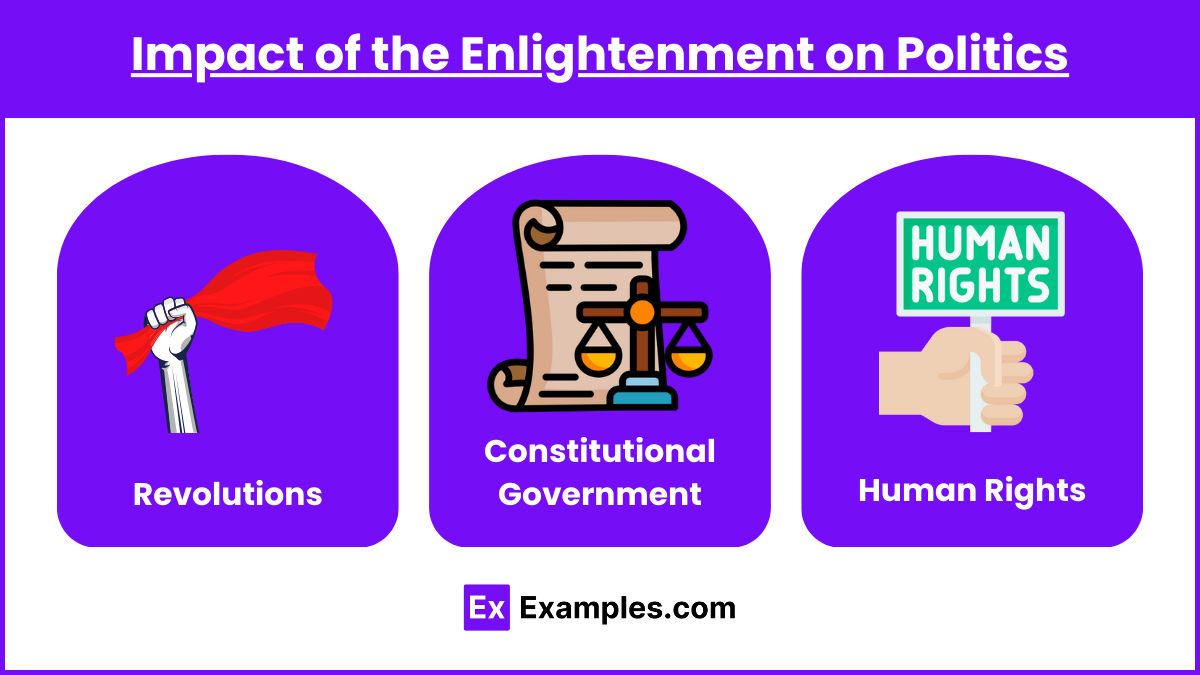
- Revolutions: Enlightenment ideas significantly influenced the American Revolution (1776) and the French Revolution (1789). Concepts like liberty, equality, and democratic governance challenged existing monarchies and aristocracies.
- Constitutional Government: The movement inspired the creation of modern democratic institutions. For example, the U.S. Constitution and Bill of Rights were heavily influenced by Enlightenment ideals of liberty and justice.
- Human Rights: The Enlightenment laid the groundwork for the development of human rights, including freedom of speech, the right to a fair trial, and protection from arbitrary rule.
3. Social and Cultural Effects
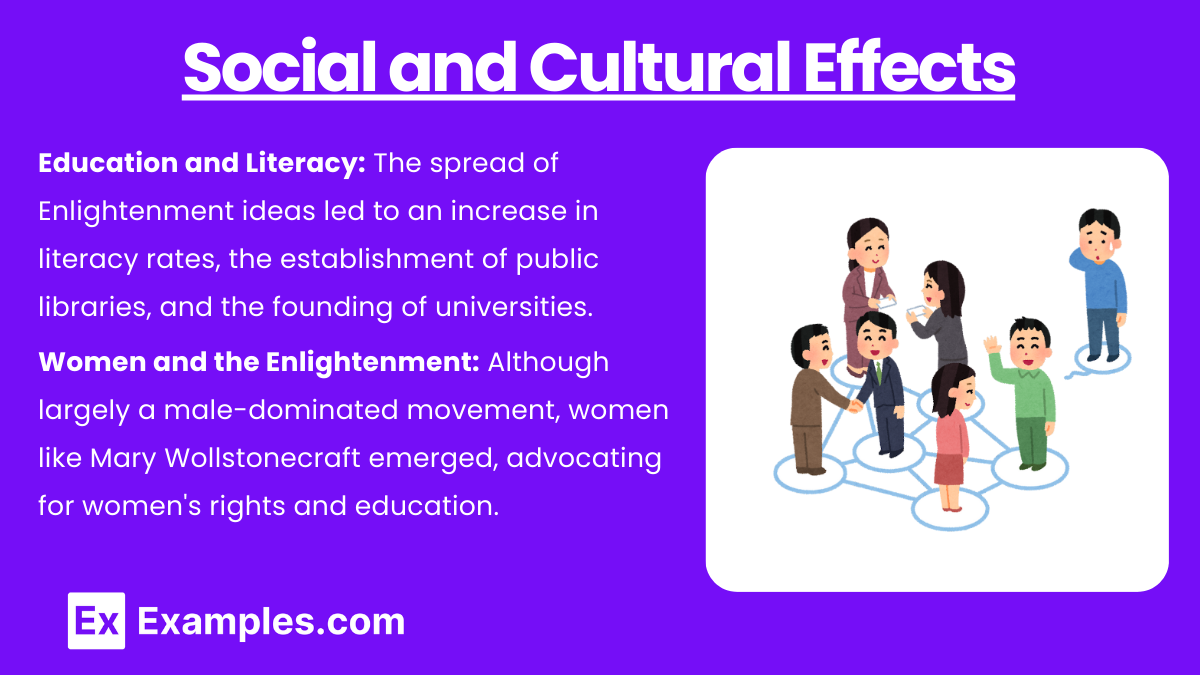
- Education and Literacy: The spread of Enlightenment ideas led to an increase in literacy rates, the establishment of public libraries, and the founding of universities. Education was seen as a means to cultivate rational thought and informed citizenship.
- Women and the Enlightenment: Although largely a male-dominated movement, women like Mary Wollstonecraft emerged, advocating for women’s rights and education. Her work, “A Vindication of the Rights of Woman,” argued for gender equality in education and opportunities.
4. Economic Ideas of the Enlightenment
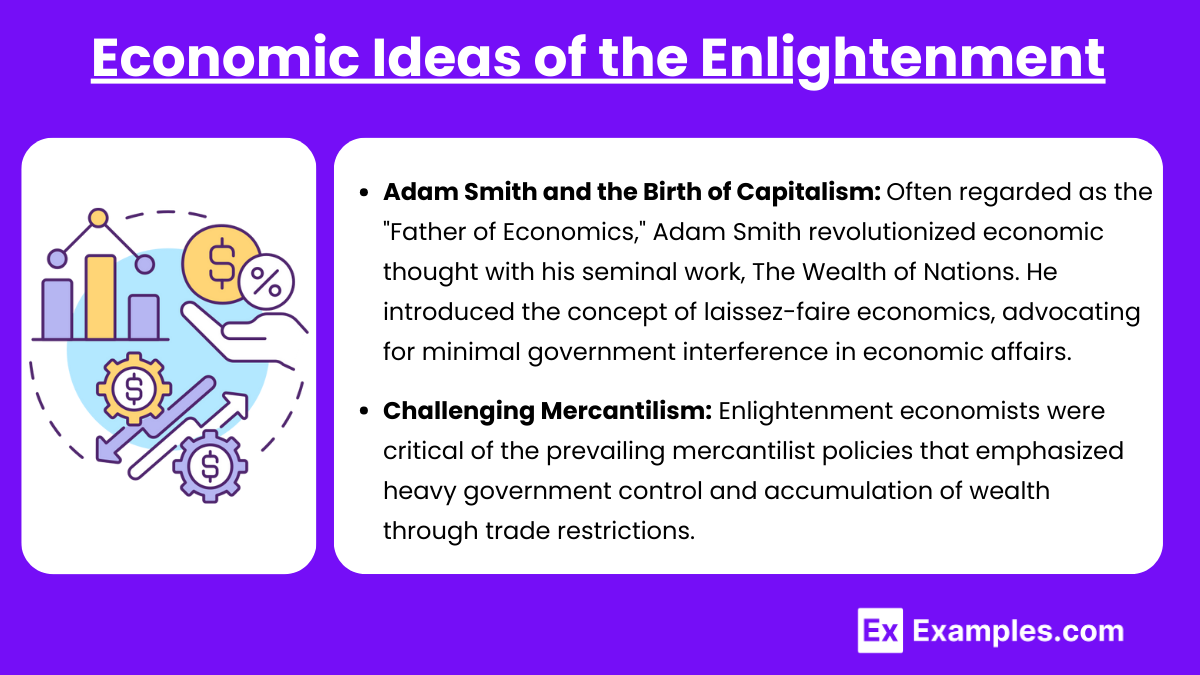
- Adam Smith and the Birth of Capitalism: Often regarded as the “Father of Economics,” Adam Smith revolutionized economic thought with his seminal work, The Wealth of Nations. He introduced the concept of laissez-faire economics, advocating for minimal government interference in economic affairs. Smith emphasized the efficiency and self-regulating nature of free markets, where individuals pursuing their own interests contribute to overall societal prosperity.
- Challenging Mercantilism: Enlightenment economists were critical of the prevailing mercantilist policies that emphasized heavy government control and accumulation of wealth through trade restrictions. Instead, they championed the principles of free trade and open competition. Smith introduced the idea of the “invisible hand,” suggesting that market forces, when left to operate freely, would naturally regulate the economy and promote wealth and efficiency.
5. Art and Literature
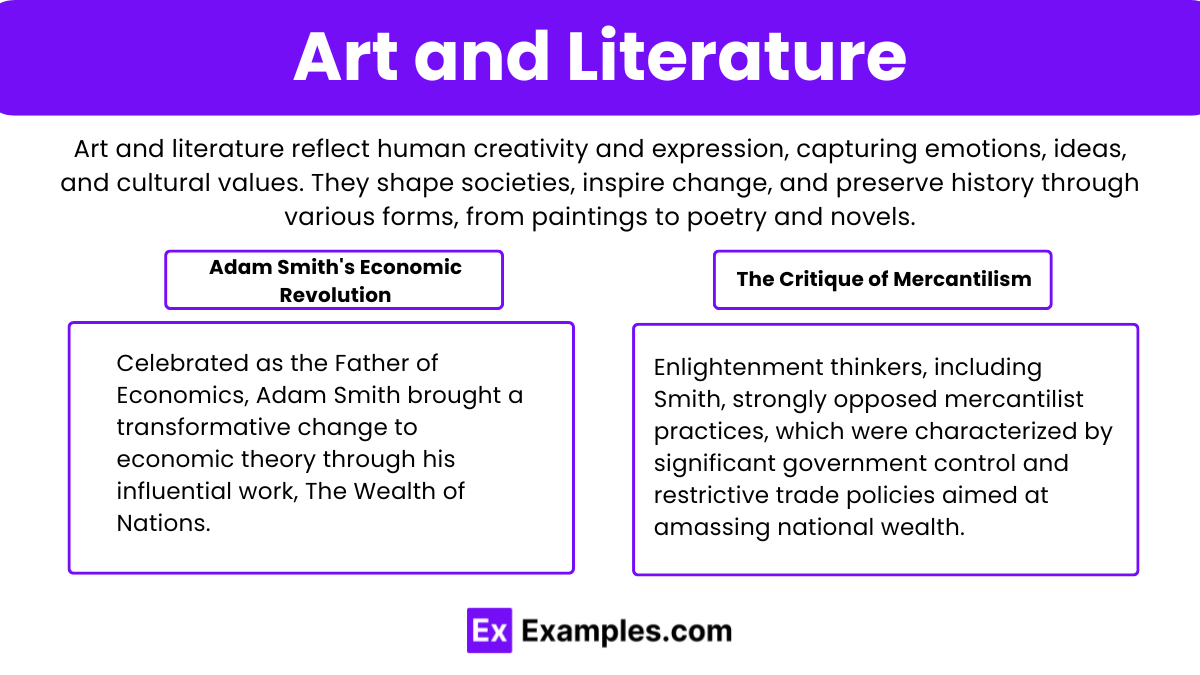
Art and literature reflect human creativity and expression, capturing emotions, ideas, and cultural values. They shape societies, inspire change, and preserve history through various forms, from paintings to poetry and novels.
- Adam Smith’s Economic Revolution: Celebrated as the “Father of Economics,” Adam Smith brought a transformative change to economic theory through his influential work, The Wealth of Nations. He laid the foundation for laissez-faire economics, advocating for minimal government intervention in the market. Smith argued that when individuals are free to pursue their self-interests, the efficiency and productivity of free markets naturally flourish, leading to overall societal prosperity.
- The Critique of Mercantilism: Enlightenment thinkers, including Smith, strongly opposed mercantilist practices, which were characterized by significant government control and restrictive trade policies aimed at amassing national wealth. Instead, they advocated for open competition and the ideals of free trade. Smith’s concept of the “invisible hand” suggested that, without government interference, market forces would organically regulate themselves, ensuring economic growth, efficiency, and wealth creation.
Examples
Example 1: The American Revolution (1776)
Enlightenment ideas like liberty, natural rights, and government by consent inspired the American Revolution. The Declaration of Independence and the U.S. Constitution were shaped by these principles, establishing democracy.
Example 2: The French Revolution (1789)
Influenced by Enlightenment thinkers, the French Revolution aimed to abolish absolute monarchy and establish equality, liberty, and fraternity. It led to the Declaration of the Rights of Man, advocating individual rights.
Example 3: The Scientific Revolution
Enlightenment encouraged scientific inquiry, with figures like Newton and Galileo promoting observation and experimentation. This shifted society’s understanding of the natural world from religious explanations to rational, evidence-based knowledge.
Example 4: The Development of Deism
Enlightenment thinkers like Voltaire embraced Deism, believing in a rational Creator without religious doctrine. It emphasized that the universe operated on natural laws, prioritizing reason over traditional religious beliefs.
Example 5: The Encyclopedie
Compiled by Denis Diderot, the Encyclopedie collected human knowledge across various fields. It spread Enlightenment ideas, promoting education, rational thought, and challenging established authorities, contributing to intellectual progress.
MCQs
Question 1
Which Enlightenment thinker is most associated with the concept of the social contract and the idea that government should reflect the general will of the people?
A) Voltaire
B) John Locke
C) Jean-Jacques Rousseau
D) Baron de Montesquieu
Answer: C) Jean-Jacques Rousseau
Explanation
Jean-Jacques Rousseau is closely associated with the concept of the social contract, as outlined in his work The Social Contract. He argued that governments should be based on the general will of the people, meaning that political authority is legitimate only if it reflects the collective interests of society. Unlike other thinkers, Rousseau emphasized the importance of direct democracy and the idea that the people themselves should have a say in the laws governing them.
Question 2
How did the Enlightenment influence the American Revolution?
A) It encouraged the development of absolute monarchy.
B) It introduced the concept of divine right of kings.
C) It promoted ideas of liberty, individual rights, and government by consent.
D) It emphasized the need for religious authorities to rule the state.
Answer: C) It promoted ideas of liberty, individual rights, and government by consent.
Explanation
The Enlightenment had a profound impact on the American Revolution by introducing the concepts of liberty, individual rights, and government by consent. Thinkers like John Locke argued for natural rights and the idea that governments should be based on the consent of the governed. These ideas were incorporated into key American documents, such as the Declaration of Independence and the U.S. Constitution, which emphasized democratic principles and the protection of individual freedoms.
Question 3
Which Enlightenment thinker proposed the separation of powers within a government to prevent tyranny?
A) Thomas Hobbes
B) Immanuel Kant
C) Baron de Montesquieu
D) Adam Smith
Answer: C) Baron de Montesquieu
Explanation
Baron de Montesquieu is known for proposing the idea of the separation of powers within a government. In his work The Spirit of the Laws, he suggested that dividing government authority into three branches—legislative, executive, and judicial—would prevent any single entity from becoming too powerful, thereby avoiding tyranny. This concept greatly influenced the structure of modern democratic governments, including the U.S. system of checks and balances.

